This week, the UK’s North Sea Transition Authority (NSTA) approved the first phase of development at Equinor and Ithaca Energy’s Rosebank offshore oil and gas project, as the UK looks to ensure its energy security in the coming years.
Equinor plans to begin subsea installations in 2024, before drilling the project’s wells in 2025 and produce first oil in the fourth quarter of 2026. At its peak, the project is expected to produce 69,000 barrels of oil per day, alongside 44 million cubic feet of oil per day, and represents a massive investment of £8.1 billion on the part of Equinor.
“The jobs and billions of pounds this is worth to our economy will enable us to have greater energy independence, making us more secure against tyrants like Putin,” said UK energy security secretary Claire Coutinho, pointing to Russia’s invasion of Ukraine as a motivating factor behind the permitting decision.
Prior to the invasion, after which many countries, including the UK, stopped importing Russian energy products, Russia was the UK’s largest supplier of refined oil. By November 2022, the UK imported 96.5% less oil than in the 12 months to February 2022, creating a significant gap in the UK energy mix that the government is seeking to fill with projects such as Rosebank.
“We will continue to back the UK’s oil and gas industry to underpin our energy security, grow our economy and help us deliver the transition to cheaper, cleaner energy,” added Coutinho.
Environmental concerns remain
The decision has drawn criticism from organisations across a number of sectors, who believe that the approval of such a project amounts to a complete abandonment of the UK’s climate change goals.
In 2021, the government signed the North Sea Transition Deal (NSTD) with oil and gas majors active in the UK, which set out a number of ambitious targets for the UK’s oil and gas sector, most notably the reduction of industry emissions by 15 million tonnes per year by 2030.
In August this year, a cross-party group of 50 MPs and peers argued that the Rosebank project would generate 200 million tonnes of emissions until Equinor plans to stop production in 2050. Earlier this year, UK climate research firm Uplift published a report noting that the production of Rosebank alone would lead to the UK oil and gas industry exceeding its 2028-32 emissions budget by around 10%, and that all of the oilfields in the UK pipeline would drive the UK to exceed its carbon budget by almost 40%.
“Giving the green light to Rosebank will send UK emissions soaring while failing to boost energy security or reduce bills,” said Danny Gross, a campaigner at environmental charity Friends of the Earth, which has strongly opposed the project on environmental grounds.
There are also concerns that the agreement reflects poorly on the UK government’s sincerity in its climate change commitments. Earlier this week, Prime Minister Rishi Sunak abandoned plans to phase-out new petrol and diesel cars by 2030, which led to support for the government declining sharply, and the approval of the UK’s largest untapped oil and gas project will do little to ease fears that decarbonisation is not a priority for the current government.
“A week after a swathe of net zero U-turns and a few days after abandoning the expert Energy Efficiency Taskforce, the Prime Minister has shown that he’d rather give tax breaks to oil companies than lower energy bills,” said Jess Ralston, an energy analyst at the Energy and Climate Intelligence Unit, a thinktank based in the UK.
“It won’t help one bit”
A key argument in favour of the Rosebank project is that the facility, alongside other large-scale oil and gas projects, could prove to be lucrative investments as Europe looks for alternative sources of energy following Russia’s Invasion of Ukraine.
In its announcement of the project’s approval, the UK government pointed to the fact that the oil and gas industry adds £17 billion to the UK economy each year, and is expected to provide £50 billion in tax revenue over the next five years, suggesting that the country, as a whole, could benefit from such large-scale investments.
Equinor, for its part, is adamant that the project will engage in measures to minimise emissions, such as the electrification and optimisation of operations, and deliver economic benefits to the UK. Equinor estimates that the project will add £2.1 billion to the UK economy each year, and will support 1,600 new jobs at its peak.
However, Ralston argued that many of these benefits will be felt by oil and gas majors, in this case Equinor and Ithaca, rather than UK citizens.
“Taxpayers will fork out around £4 billion to the developers of the oil field, money that could have insulated millions of homes with many set to be colder and poorer this winter,” said Ralston.
“To make matters worse, Rosebank oil will mostly be exported and then sold back to us at whatever price the oil companies can get,” added Ralston. “So it won’t help one bit with energy independence or gas bills, despite the government’s rhetoric. New renewables could help, but Treasury rules meant that no new wind power was secured at the latest renewable auction.”





